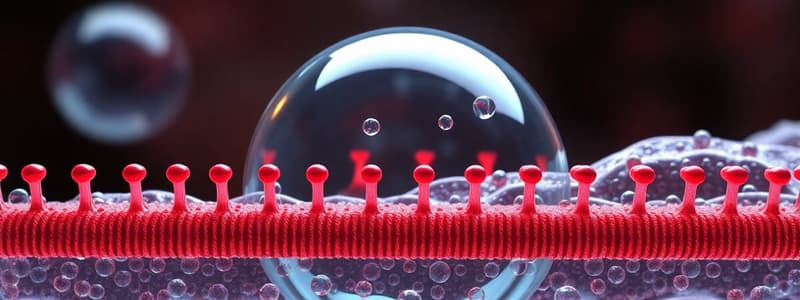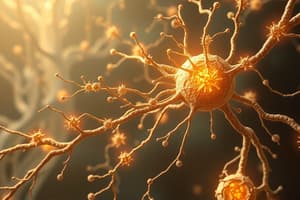Podcast
Questions and Answers
What is the effect of charge interaction on force?
What is the effect of charge interaction on force?
- It results in a magnetic force rather than an electric force.
- It creates force in opposite directions of each charge. (correct)
- It creates force in the same direction as the charge.
- It eliminates the force between the charges.
Which of the following statements best describes the relationship between charge and force?
Which of the following statements best describes the relationship between charge and force?
- Like charges attract each other, creating no force.
- Unlike charges repel each other, resulting in a strong force.
- Opposite charges exert forces against each other. (correct)
- All charges create force regardless of their type.
How do opposite charges behave in terms of force generation?
How do opposite charges behave in terms of force generation?
- They generate force directed towards each other.
- They create a repulsive force.
- They generate no force at all.
- They create a force directed away from each charge. (correct)
What occurs when two identical charges interact?
What occurs when two identical charges interact?
In the case of opposite charges, what can be inferred about the force they generate?
In the case of opposite charges, what can be inferred about the force they generate?
What instrument is used to measure the potential difference across the cell membrane?
What instrument is used to measure the potential difference across the cell membrane?
Which of the following best describes the role of microelectrodes in measuring membrane potential?
Which of the following best describes the role of microelectrodes in measuring membrane potential?
Why is a sensitive voltmeter necessary for measuring membrane potential?
Why is a sensitive voltmeter necessary for measuring membrane potential?
What is being measured when assessing membrane potential across a cell membrane?
What is being measured when assessing membrane potential across a cell membrane?
What physical principle allows microelectrodes to measure membrane potential?
What physical principle allows microelectrodes to measure membrane potential?
What is the primary characteristic of the cell membrane that leads to membrane potential?
What is the primary characteristic of the cell membrane that leads to membrane potential?
Which factor directly influences the generation of the resting membrane potential?
Which factor directly influences the generation of the resting membrane potential?
What does it mean when a cell membrane is described as polarized?
What does it mean when a cell membrane is described as polarized?
Which of the following is NOT a factor contributing to the overall membrane potential?
Which of the following is NOT a factor contributing to the overall membrane potential?
How does the resting membrane potential typically behave in living cells?
How does the resting membrane potential typically behave in living cells?
Flashcards are hidden until you start studying
Study Notes
Force and Membrane Potential
- Opposite charges create force in opposite directions.
- Membrane potential can be measured using microelectrodes and a voltmeter.
Resting Membrane Potential
- The difference in ionic concentration between the inside and outside of a cell at rest is called resting membrane potential.
- This potential difference is significant in excitable cells, such as nerve cells (-70mV) and muscle cells (-90mV).
- Changes in resting membrane potential can signal a function in excitable cells.
Genesis of Resting Membrane Potential
- Resting membrane potential is generated by:
- Ion channels allowing leakage of ions across the cell membrane.
- The Na/K pump at the cell membrane.
- Negatively charged proteins and organic molecules inside the cell that cannot cross the cell membrane, making the inside of the cell negative.
- The Na/K pump transmits 3 Na+ ions outside for every 2 K+ ions transmitted inside, creating a potential difference by making the inside more negative and the outside more positive. This is referred to as an electro-genic pump.
Membrane Potential
- The cell membrane of all living cells has a membrane potential, meaning it is electrically polarized.
- This polarization arises from a separation of opposite charges across the plasma membrane.
- The difference in concentration and permeability of key ions results in a potential difference across the membrane.
- Negative charges are attracted to positive charges, forming a thin layer of negative charge inside the cell and a thin layer of positive charge outside.
- The rest of the intracellular and extracellular fluid remains neutral.
Genesis of Resting Membrane Potential
- Sodium-potassium pump actively pumps 3 sodium ions out of the cell and 2 potassium ions into the cell for every ATP molecule used.
- This creates a concentration gradient with more potassium ions inside the cell and more sodium ions outside.
- Leak channels allow potassium ions to move passively out of the cell, down their concentration gradient.
- The presence of non-diffusible anions within the cell, such as proteins and organic molecules, creates an additional negative charge inside the cell.
- These anions cannot cross the cell membrane due to their large molecular weight and repulsion by proteins in the membrane.
- The combination of these factors creates a resting membrane potential, typically around -70 mV, with the inside of the cell being negative relative to the outside.
Studying That Suits You
Use AI to generate personalized quizzes and flashcards to suit your learning preferences.



